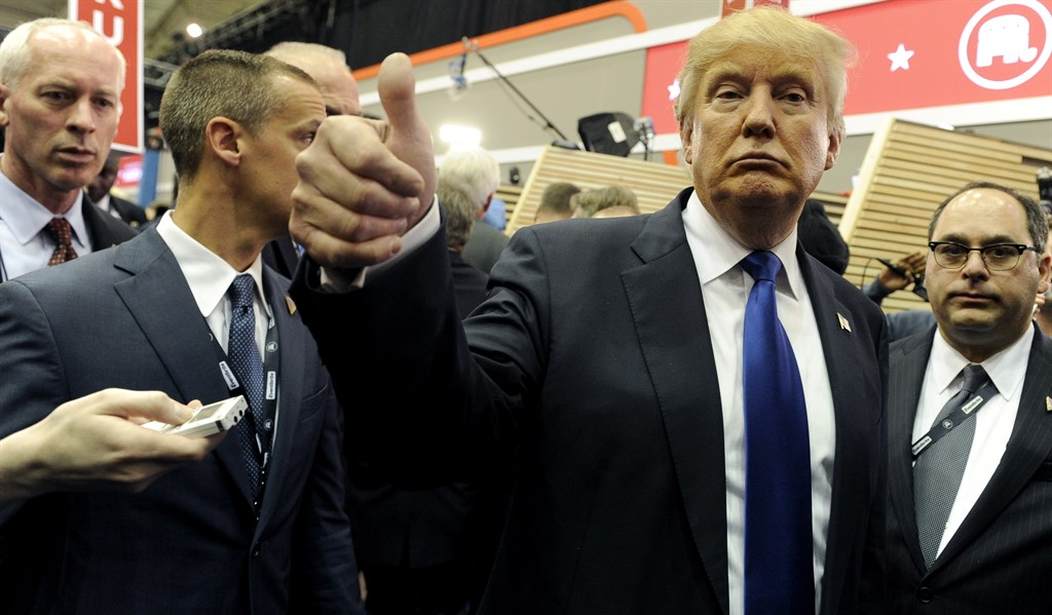Will an appeal to narcissism get Kim Jong-un back to the negotiating table? If so, perhaps Donald Trump is uniquely positioned to try that strategy. Earlier today, the president hailed Dear Leader III’s wisdom and intelligence in rejecting the missile launch toward Guam that he had earlier threatened:
https://twitter.com/realDonaldTrump/status/897784898865553409
No one knows more about ego-stroking than Trump, and this might be an effective response. All three Kims have craved equal standing with the US, which is one reason why it has gambled on nuclear-weapons development all along. The US has refused to directly negotiate with Pyongyang on the resolution of the 67-year-old state of war on the Korean peninsula, insisting that it requires a regional approach. Perhaps by acknowledging Kim Jong-un’s “wisdom” in refraining from an attack American soil, Trump hopes to appeal to Kim’s vanity, and in doing so get more cooperation on limiting missile development and nuclear tests.
Will it work? Naaaaah. But it doesn’t cost anything to try, either.
Meanwhile, China and Russia have begun working on a coordinated effort to pressure both sides into reducing tensions on the peninsula. Beijing’s foreign minister, Wang Yi, advised both Washington and Pyongyang to “hit the brakes” before someone hits a button and starts a major war:
In a sign of growing concern on the part of Pyongyang’s only major ally, Chinese Foreign Minister Wang Yi said in a phone conversation with his Russian counterpart, Sergey Lavrov, that the two countries should work together to contain tensions and permit no one to “stir up an incident on their doorstep,” according to a statement posted on the Chinese foreign ministry’s website.
“The most important task at hand is for the U.S. and North Korea to ‘hit the brakes’ on their mutual needling of each other with words and actions, to lower the temperature of the tense situation and prevent the emergence of an ‘August crisis,’” Wang was quoted as saying in the Tuesday conversation.
Both China and Russia want the US to postpone its scheduled military exercises with South Korea, due to start next Monday. The US has thus far refused to do so, while some voices in South Korea want the US to go much farther to bolster deterrence:
This has led to growing calls among South Korean conservatives for the United States to redeploy tactical nuclear weapons in South Korea after withdrawing them in the 1990s. The opposition Liberty Korea Party on Wednesday adopted the demand as its official party line, saying that the presence of such weapons would strengthen deterrence against the North.
Now that Kim has decided against the missile shot at Guam, it seems unlikely that the US would commit that level of provocation. It’s on the table nonetheless, and both North Korea and China know it. For the moment, the biggest risk for the US in advancing that option is the political blowback in Seoul, but if Kim Jong-un continues his missile tests and crazy talk, South Korean conservatives might not be alone on this push. Look how quickly left-leaning Moon Jae-in went from being a THAAD opponent to a THAAD customer.
But perhaps the flattery toward Kim is a potential test to see whether Trump can work around China. Josh Rogin reports in the Washington Post that there is greater interest in cutting China out of the loop, especially given Beijing’s failure to rein in its client state:
“An understanding between Washington and Beijing is the essential prerequisite for the denuclearization of Korea,” Kissinger argued in the Wall Street Journal, saying the United States and China should talk about the political future of North Korea after denuclearization.
Other experts contend that if Beijing won’t earnestly and honestly engage in that conversation, the United States should see whether the Kim regime might.
“When it comes to the things the Chinese fear most about the Korean Peninsula, number one is war, number two is losing North Korea to the U.S.,” said Joshua Eisenman, senior fellow at the American Foreign Policy Council and professor at the LBJ School of Public Affairs at the University of Texas at Austin. “At the very least, we should be expanding the list of items on the agenda and not limiting it to the nuclear issue.”
If the United States were to offer North Korea a package of economic benefits, security assurances and greater legitimacy, cooperating with the new engagement-friendly leadership in South Korea, it might be more appealing to Pyongyang then the relationship the regime has now with Beijing, the argument goes.
That probably has less chance of working than the flattery campaign does, and an attempt would not be cost-free. China has kept the Kim regime in place in order to prevent having a US client state on its border. They will not stand idly by if Kim switches teams, even if he were philosophically and politically inclined to do so, which he isn’t. If Kim tried it, it would not take long for Beijing to order up a military coup and put a friendlier and more easily controlled puppet on the throne of the Hermit Kingdom. Which, actually, might not be a bad outcome for us too.








Join the conversation as a VIP Member